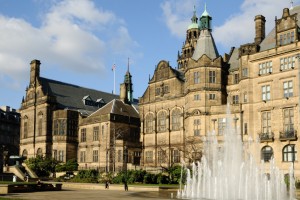 Although there has been a human presence in the area now known as Sheffield since prehistoric times, the city itself traces its roots to Anglo-Saxon and Danish settlements in the 8th century. Following the Norman Conquest in 1066, Sheffield Castle was built to protect the growing city. By the late 13th century, a market was established in present-day Castle Square. During the 17th century English Civil War, the city would see itself under attack and its castle destroyed. Situated in South Yorkshire, Sheffield owes much of its development to industry and steel production.
Although there has been a human presence in the area now known as Sheffield since prehistoric times, the city itself traces its roots to Anglo-Saxon and Danish settlements in the 8th century. Following the Norman Conquest in 1066, Sheffield Castle was built to protect the growing city. By the late 13th century, a market was established in present-day Castle Square. During the 17th century English Civil War, the city would see itself under attack and its castle destroyed. Situated in South Yorkshire, Sheffield owes much of its development to industry and steel production.
Sheffield was a major centre for industrial change during the 19th century and the source of significant inventions, including stainless steel, silver-plated copper, crucible steel, and high-strength low-alloy steels. Coal mining was also a major economic driver in the area surrounding the city. The economy of Sheffield saw a major transformation over the past 20 years with the decline of iron and steel industries due to increased international competition during the 1970s and 1980s. Founded in 1805, the only remaining steel works in Sheffield is Forgemasters. The city is increasingly known as a centre for excellence in a number of sectors, according to the State of Sheffield 2013 Report. The city continues to be a centre for innovation in the advanced manufacturing sector, which is concentrated at the Advanced Manufacturing Park (AMP) in Sheffield. The AMP is home to the Advanced Manufacturing Research Centre (AMRC), Castings Technology International (CTi), and The Welding Institute (TWI)
Much of the city’s economy is driven by small and medium sized enterprises, according to the State of Sheffield 2013 report. In 2012, an estimated 783,600 people worked in the Sheffield City Region, with 80 percent of workers employed in service sectors. The city’s largest employers include its two universities, the National Health Service (NHS), and national and local government agencies. An estimated 13 percent of Sheffield’s workers are employed in manufacturing, a figure that is higher than the national average. Other significant sources of employment include finance, business and technical services (16 percent), retail, food and drink serving sectors (15 percent), and the hospital and medical sector (10 percent). Major retail centres include The Moor, Fargate, Orchard Square and Devonshire Quarter in the city centre, as well as Meadowhall and Crystal Peaks shopping centres.
In recent years, Sheffield has seen historic levels of population growth and economic diversification. The city is home to an estimated 551,800, according to the Office of National Statistics (ONS) and the 2011 Census. From 2001 to 2011, Sheffield’s population increased by 38,700 people or 7.5 percent. The city is also home to over 61,300 students who attend the University of Sheffield and Sheffield Hallam University. The city covers an area of 367.94 square kilometres or 142.06 square miles, and has a population density of approximately 1,500 people per square kilometre or 4,000 per square mile.
Sheffield sits in the valleys of the River Don and its tributaries. With an estimated 2 million trees, Sheffield is one of the greenest cities in Europe. The city is home to over 250 parks, woodlands and gardens, according to Sheffield City Council. One third of the city also lies within the borders of the Peak District National Park. Sheffield is also known as a music centre, particularly for synth pop and electric music. Human League, Arctic Monkeys, Pulp, Def Leppard, and many other bands have links to the city. Sheffield also hosts Tramlines, an annual music festival held across the city centre in July. Major attractions in the city include the Millennium Galleries, Winter Garden, the Sheffield Botanical Gardens and Tudor Square, which is the site of many of the city’s theatres. The city is also well connected to road, air and rail links to continental Europe and ports in Hull. Sheffield sits along the M1 and M18 motorway corridors, and close to Robin Hood Doncaster Sheffield Airport. Sheffield Railway Station also provides direct links to London, Liverpool, Manchester, and other communities throughout England and Scotland.

